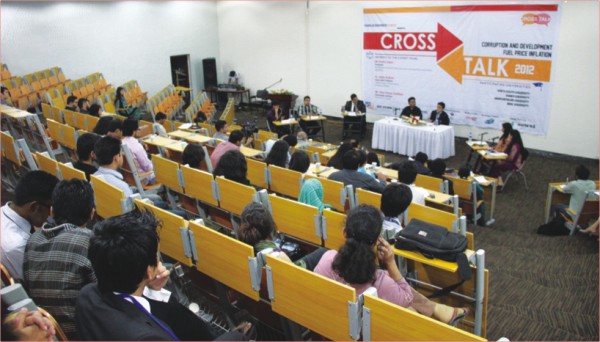| Home - Back Issues - The Team - Contact Us |
 Linking Young Minds Together |
| Volume 6 | Issue 15 | April 16, 2012 | |
|
|
After Class Cross-Talk: Letting the Students Speak Saad Adnan Khan If students do not talk, then who will? The whole point of studying at university is that students come out of their comfort zone and take part in discussions. The more platforms universities provide students to voice out, the better it is for students to grow intellectually and think of solutions for the problems our world is facing. On April 8, 2012, North South University Young Economist Forum (NSUYEF), a student club of North South University (NSU), organised “Cross-Talk”, where eight students from NSU, Dhaka University (DU), Jahangirnagar University (JU) and BRAC University came together and spoke on pressing economic issues of the country. The format of the talk-show is inspired by programmes like Dateline London and Doha Debates (aired on BBC). YEF introduced Cross-Talk in 2006 in NSU.
The talk show revolved around two issues: 'Corruption and Development: A paradox' and 'Fuel Price Inflation: Challenges and Solution'. The special guests who formed the panel of experts simultaneously took part in the discussion, by intervening and adding valuable insights to what the students spoke about. It was like sitting in a classroom, except that the discussion and learning took place in a much broader manner, by including students and teachers from different universities and institutions. The panel of experts included Dr Selim Raihan (Associate Professor, Dhaka University), Dr AKM Atiqur Rahman (Dean, Department of Economics, NSU) and Shafiul Islam (President, BGMEA).
The eight students were asked different questions by the moderator of the event, Prometheus Siddique. Regarding fuel price inflation, the speakers talked about hike in fuel price and the economic impacts of such a phenomenon on other sectors such as power, environment, inflation in food price and garments, manufacturing and export, about depreciation of the Bangladeshi taka and liquidity crisis. Regarding corruption and development, the speakers spoke on income loss due to bribery, wage difference issues, misallocation of resources, effects on the lower socio-economic classes and corruption in public and private sectors. Students gave strong opinions and expressed their views, and talked about chain of events and pointed out how everything is interconnected. The speakers answered questions from the moderator and audience, addressing current national and international events and applying their knowledge and understanding to talk about recent global economic crises and solutions. Through their arguments, they proved that the economy of a nation is multifaceted and cannot be understood by studying it in a one dimensional way.
“We are talking about students of Economics here. For them, it is important that they link their research findings with the practical world and understand what is happening in the real economy in terms of trade, macroeconomics etc. Thus there should be more events and seminars like this, where students can get involved in direct dialogues and interactions, because learning in this way can be very effective. The topics are very relevant and important, when the current situation of Bangladesh is concerned, and the students were successful in presenting many interesting points,” says Dr Selim Raihan. Optimistic and hopeful comments appeared, despite the several bleak outcomes that these economic events point to. Dr Raihan mentioned that the Bangladesh economy has a tremendous absorption capacity. Dr Rahman said that resilience of the people of Bangladesh is commendable. At the end of the second discussion, the conclusion drawn was that the educational institutions have to be reformed. The education system and the society at large need to implement codes of ethical and moral values. The student speakers were Rehnuma Jahan Islam, Sangyukta Nath, Samanta Farahnaz, Urmila Tamanna Ashrafee and Rubana Shifat from NSU, Noor Alam from JU, Rubait Rahman from DU and Ratib Mortuza Ali from BRAC University. Students, if given more opportunities, like this one, to speak their minds and be vocal about theories, criticism and application, will grow and mature as intelligent and pro-active global individuals.
|
||||
Copyright
(R) thedailystar.net 2012 |


